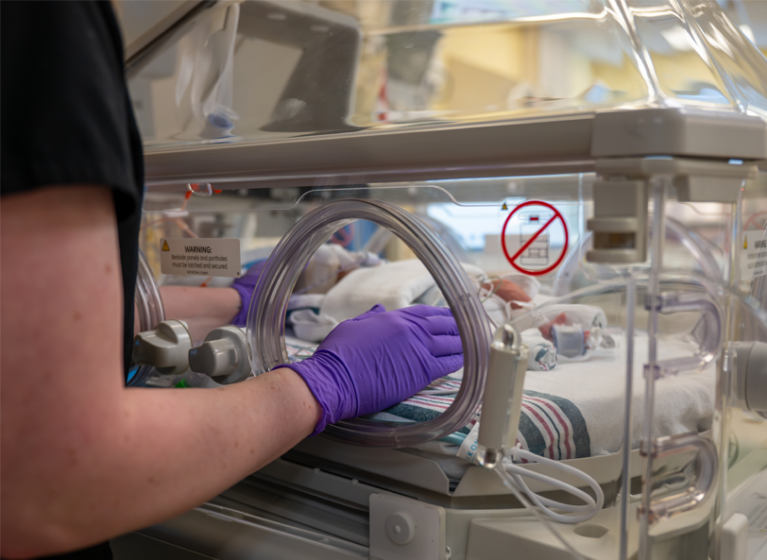
Patent ductus arteriosus (PDA) may only represent 10% of all CHDs, but in premature infants, it’s at least double that. And amongst the smallest, or those weighing under 3 pounds, it’s more common to have a PDA than not.
A transcatheter occlusion surgery available at UVA Health Children’s can offer a minimally invasive alternative to traditional heart surgery that’s safer than medication therapy. Percutaneous occlusion left to right (POLeR) has been shown to be an effective strategy.
And with our experienced neonatal transportation team, we can safely bring these neonates from your NICU to ours.
The Trouble with PDAs
Even though PDAs are extremely common in this group, that doesn’t mean they’re without complications. The biggest concern in extremely premature infants is the health and capacity of their lungs.
A PDA can impact breathing, causing infants to breathe faster and harder. It can also lead to fluid buildup, making it even harder to breathe.
Waiting Too Long Has Costs
The medications used to manage fluid overload related to PDA can cause electrolyte abnormalities. And medication therapy can cause brain bleeds and future challenges with gut health. These are problems that extremely premature infants are already at increased risk from.
And as long as there are struggles with breathing, premature infants need prolonged oxygen therapy or mechanical ventilation. This can cause additional risk of retinopathy of prematurity or ongoing lung and respiratory concerns.
It’s better to consult with the POLeR team early.
Which Patients Should POLeR Consult On?
POLeR is an appropriate treatment for infants with a PDA and a need for respiratory support.
It’s also an approach worth considering for patients with PDAs of moderate to large size ideally when the baby is between 4-6 weeks post-birth.
If a patient meets the above criteria, teams should reach out to the POLeR team. If they agree the intervention is likely beneficial, they’ll begin to make arrangements for transfer.
After the procedure is complete, the baby will stay in UVA Health Children’s NICU for 1-3 days.
Then we’ll arrange for them to be transferred back to their home institution. By working closely with referring institutions, the POLeR team acts as a resource for all primary care teams.